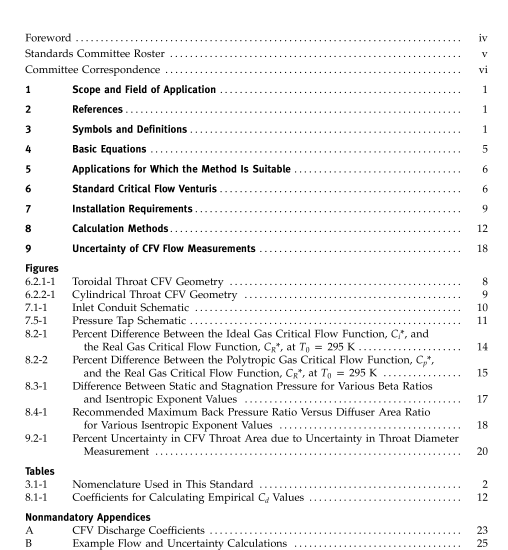ASME MFC-7:2016 pdf download Measurement of Gas Flow by Means of Critical Flow Venturis and Critical Flow Nozzles
5 APPLICATIONS FOR WHICH THE METHOD IS SUITABLE Each application should be evaluated to determine whether a CFV is suitable for the conditions and requirements. An important advantage of a CFV is that the flow through it is independent of the downstream pressure as long as the pressure conditions up- and downstream from the CFV lead to critical flow at the throat. The following are some other considerations:
(a) To calculate flow through a CFV, the only measurements required are the gas composition, and the pressure and temperature upstream of the CFV. These measurements enable the throat conditions to be calculated from thermodynamic considerations. A low-uncertainty measurement of the throat diameter is also required if C d values are determined using the empirical equations in this Standard. In contrast, if the CFV is flow calibrated, only a nominal value of the diameter is necessary (see examples in Nonmandatory Appendix B). CFVs are applicable when there is no phase change as the gas accelerates from the inlet to the throat and the flow is not a function of the downstream pressure (i.e., the CFV is choked). Care must be taken when using an equation of state at or near the dew point of the gas so that correct gas phase properties are determined. Studies have shown that condensation rates in the presence of favorable pressure gradients and rapidly falling temperatures are much slower than the transit time of the fluid from the CFV entrance to the CFV throat. Therefore, the CFV will operate correctly and yield the correct flow, provided that the calculations for the speed of sound and density at the throat are correct.
(b) The velocity in the CFV throatis the maximum possible for the given upstream stagnationconditions; therefore, the sensitivity to installation effects is minimized, except for swirl, which must not exist in the inlet plane of the CFV. (c) Unlike the subsonic differential pressure device, CFV flow is proportional to the inlet stagnation pressure and not to the square root of a measured differential pressure. (d) The maximum flow range that can be obtained for a given CFV is limited to the range of inlet pressures that are available above the inlet pressure at which the flow becomes critical. (e) The most common applications for CFVs are the calibration of other meters (working or reference standards) and verification or comparison of primary flow standards (check or transfer standards) in flow control applications and in product testing.
6 STANDARD CRITICAL FLOW VENTURIS
6.1 General Requirements
6.1.1 Discharge Coefficient. The discharge coefficient, C d , for a CFV may be obtained by either the empirical method (using empirical or theoretical equations of C d versus Reynolds number) or the calibration method (calibra- tion of the particular CFV in a flow laboratory). When using empirical C d values, the specifications for size, shape, and surface conditions are pertinent to obtaining the performance specified in this Standard. In these cases the CFV should be inspected to determine conformance to construction specifications of this Standard. In the case of laboratory-determined C d values, compliance with the following construction specifications is less pertinent. When it is not practical to manufacture CFVs to the surface finish and curvature specifications herein, CFV performance must be demonstrated through calibration against a flow reference.
6.1.2 Materials. CFVs should be manufactured from material suitable for the intended application, such as the following:
(a) The material should be capable of being finished to the surface condition specified in this Standard. Some materials are unsuitable because of pits, voids, and other nonhomogeneities.
(b) The material, together with any surface treatment used, should not be subject to corrosion in the intended service. Experience has shown that 300 series stainless steel is often a suitable material.
